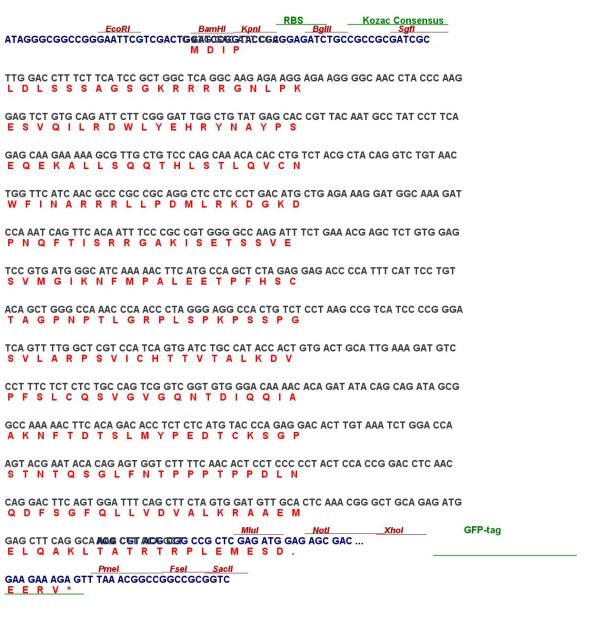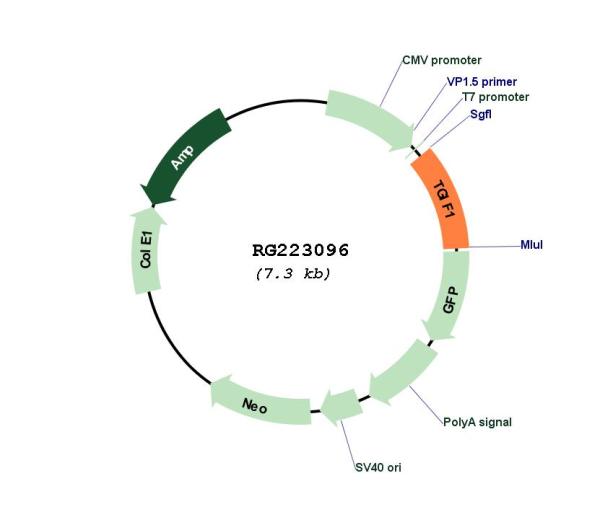TGIF (TGIF1) (NM_173209) Human Tagged ORF Clone
SKU
RG223096
TGIF1 (tGFP-tagged) - Human TGFB-induced factor homeobox 1 (TGIF1), transcript variant 5
-
TrueORF®
TrueORF®
Expression-ready ORF plasmid with C-terminal tag(s)
Click here to learn more.
| Product Data | |
| Type | Human Tagged ORF Clone |
|---|---|
| Target Symbol | TGIF |
| Synonyms | HPE4; TGIF |
| Vector | pCMV6-AC-GFP |
| E. coli Selection | Ampicillin (100 ug/mL) |
| Mammalian Cell Selection | Neomycin |
| Restriction Sites |
SgfI-MluI Cloning Scheme for this gene
Plasmid Map

|
| ACCN | NM_173209 |
| ORF Size | 756 bp |
| OTI Disclaimer | The molecular sequence of this clone aligns with the gene accession number as a point of reference only. However, individual transcript sequences of the same gene can differ through naturally occurring variations (e.g. polymorphisms), each with its own valid existence. This clone is substantially in agreement with the reference, but a complete review of all prevailing variants is recommended prior to use. More info |
| OTI Annotation | This clone was engineered to express the complete ORF with an expression tag. Expression varies depending on the nature of the gene. |
| Components | The ORF clone is ion-exchange column purified and shipped in a 2D barcoded Matrix tube containing 10ug of transfection-ready, dried plasmid DNA (reconstitute with 100 ul of water). |
| Reconstitution Method | 1. Centrifuge at 5,000xg for 5min. 2. Carefully open the tube and add 100ul of sterile water to dissolve the DNA. 3. Close the tube and incubate for 10 minutes at room temperature. 4. Briefly vortex the tube and then do a quick spin (less than 5000xg) to concentrate the liquid at the bottom. 5. Store the suspended plasmid at -20°C. The DNA is stable for at least one year from date of shipping when stored at -20°C. |
| Note | Plasmids are not sterile. For experiments where strict sterility is required, filtration with 0.22um filter is required. |
| Shipping | Ambient |
| Reference Data | |
| RefSeq | NM_173209.1, NP_775301.1 |
| RefSeq Size | 1382 bp |
| RefSeq ORF | 759 bp |
| Locus ID | 7050 |
| UniProt ID | Q15583 |
| Cytogenetics | 18p11.31 |
| Protein Families | Druggable Genome, Stem cell - Pluripotency, Stem cell relevant signaling - TGFb/BMP signaling pathway, Transcription Factors |
| Summary | The protein encoded by this gene is a member of the three-amino acid loop extension (TALE) superclass of atypical homeodomains. TALE homeobox proteins are highly conserved transcription regulators. This particular homeodomain binds to a previously characterized retinoid X receptor responsive element from the cellular retinol-binding protein II promoter. In addition to its role in inhibiting 9-cis-retinoic acid-dependent RXR alpha transcription activation of the retinoic acid responsive element, the protein is an active transcriptional co-repressor of SMAD2 and may participate in the transmission of nuclear signals during development and in the adult. Mutations in this gene are associated with holoprosencephaly type 4, which is a structural anomaly of the brain. Alternative splicing has been observed at this locus and multiple splice variants encoding distinct isoforms are described. [provided by RefSeq, Jul 2013] |
Write Your Own Review
| Product Manuals |
| FAQs |
| SDS |
| SKU | Description | Size | Price | |
|---|---|---|---|---|
| RC223096 | TGIF1 (Myc-DDK-tagged)-Human TGFB-induced factor homeobox 1 (TGIF1), transcript variant 5 | 10 ug |
$289.00
MSRP
$300.00
MSRP
$300.00
|
|
| RC223096L3 | Lenti-ORF clone of TGIF1 (Myc-DDK-tagged)-Human TGFB-induced factor homeobox 1 (TGIF1), transcript variant 5 | 10 ug |
$600.00
|
|
| RC223096L4 | Lenti-ORF clone of TGIF1 (mGFP-tagged)-Human TGFB-induced factor homeobox 1 (TGIF1), transcript variant 5 | 10 ug |
$600.00
|
|
| SC124492 | TGIF1 (untagged)-Human TGFB-induced factor homeobox 1 (TGIF1), transcript variant 5 | 10 ug |
$300.00
|
|
Citations
*Delivery time may vary from web posted schedule. Occasional delays may occur due to unforeseen
complexities in the preparation of your product. International customers may expect an additional 1-2 weeks
in shipping.



